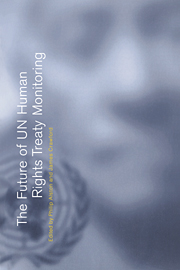Book contents
- Frontmatter
- Contents
- List of Tables, Figure, Appendices
- Notes on Contributors
- Editors' Preface
- Table of Treaties
- Table of Cases
- List of Abbreviations
- 1 The UN human rights treaty system: A system in crisis?
- A The UN human rights monitoring system in action
- B National influences and responses
- C Regional and sectoral comparisons
- D Common challenges for the treaty bodies
- 18 The problem of overlapping among different treaty bodies
- 19 Bodies of knowledge: A diversity promotion role for the UN High Commissioner for Human Rights
- 20 Treaty bodies responding to states of emergency: The case of Bosnia and Herzegovina
- 21 Ensuring effective supervisory procedures: The need for resources
- 22 Servicing and financing human rights supervision
- E Looking to the future
- Index
21 - Ensuring effective supervisory procedures: The need for resources
Published online by Cambridge University Press: 23 December 2009
- Frontmatter
- Contents
- List of Tables, Figure, Appendices
- Notes on Contributors
- Editors' Preface
- Table of Treaties
- Table of Cases
- List of Abbreviations
- 1 The UN human rights treaty system: A system in crisis?
- A The UN human rights monitoring system in action
- B National influences and responses
- C Regional and sectoral comparisons
- D Common challenges for the treaty bodies
- 18 The problem of overlapping among different treaty bodies
- 19 Bodies of knowledge: A diversity promotion role for the UN High Commissioner for Human Rights
- 20 Treaty bodies responding to states of emergency: The case of Bosnia and Herzegovina
- 21 Ensuring effective supervisory procedures: The need for resources
- 22 Servicing and financing human rights supervision
- E Looking to the future
- Index
Summary
Introduction
Maintaining the supervisory procedures of the human rights treaty bodies calls for a certain sleight of hand – to turn less into more. At a period when the treaty bodies are seeking to make the monitoring system more effective, and when the demands on them are increasing (more parties, more reports, more individual communications), the resources available to support their work seem to be diminishing.
Insufficicent resources have been a constant problem for the treaty bodies. Despite provisions in some instruments that ‘the Secretary-General of the United Nations shall provide the necessary staff and facilities for the effective performance of the functions of the Committee' it has long been recognised that the funding of the treaty bodies and their resources are inadequate to allow them to carry out their mandate effectively. Too few professional staff have been assigned to treaty body work, and even those staff who have been assigned to this work have sometimes been seconded to other work. Some meetings have been cancelled, interpreting has sometimes been restricted and summary records are sometimes not prepared.
Far from improving, this situation threatens to get worse. Limits have been imposed on documentation and delays in translations have been chronic. Petty restrictions on the distribution of documents have frustrated the work of the Human Rights Committee (HRC). These demoralising restrictions have come at a time when the increase in ratifications, in the number of communications and in the length of reports, together with the Committee's attempts to make its procedure more effective, have increased the workload of the Secretariat.
- Type
- Chapter
- Information
- The Future of UN Human Rights Treaty Monitoring , pp. 461 - 480Publisher: Cambridge University PressPrint publication year: 2000
- 1
- Cited by



